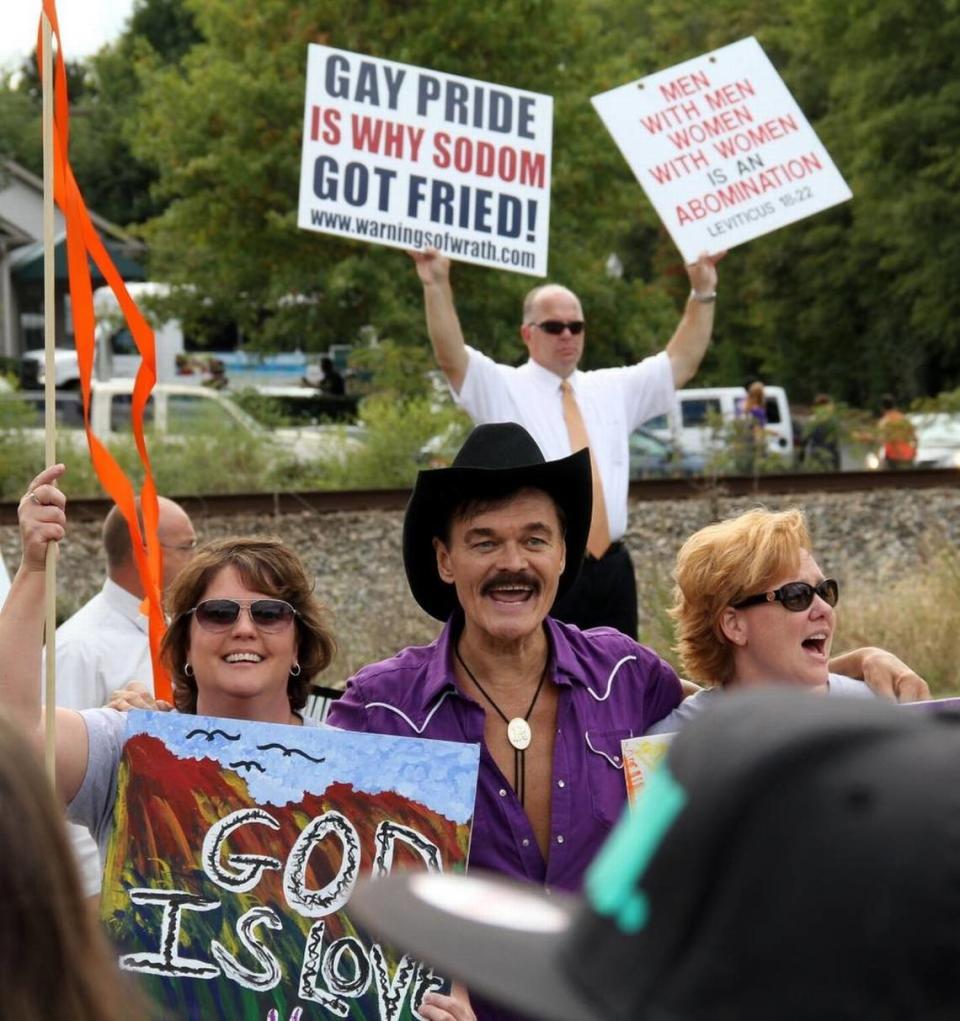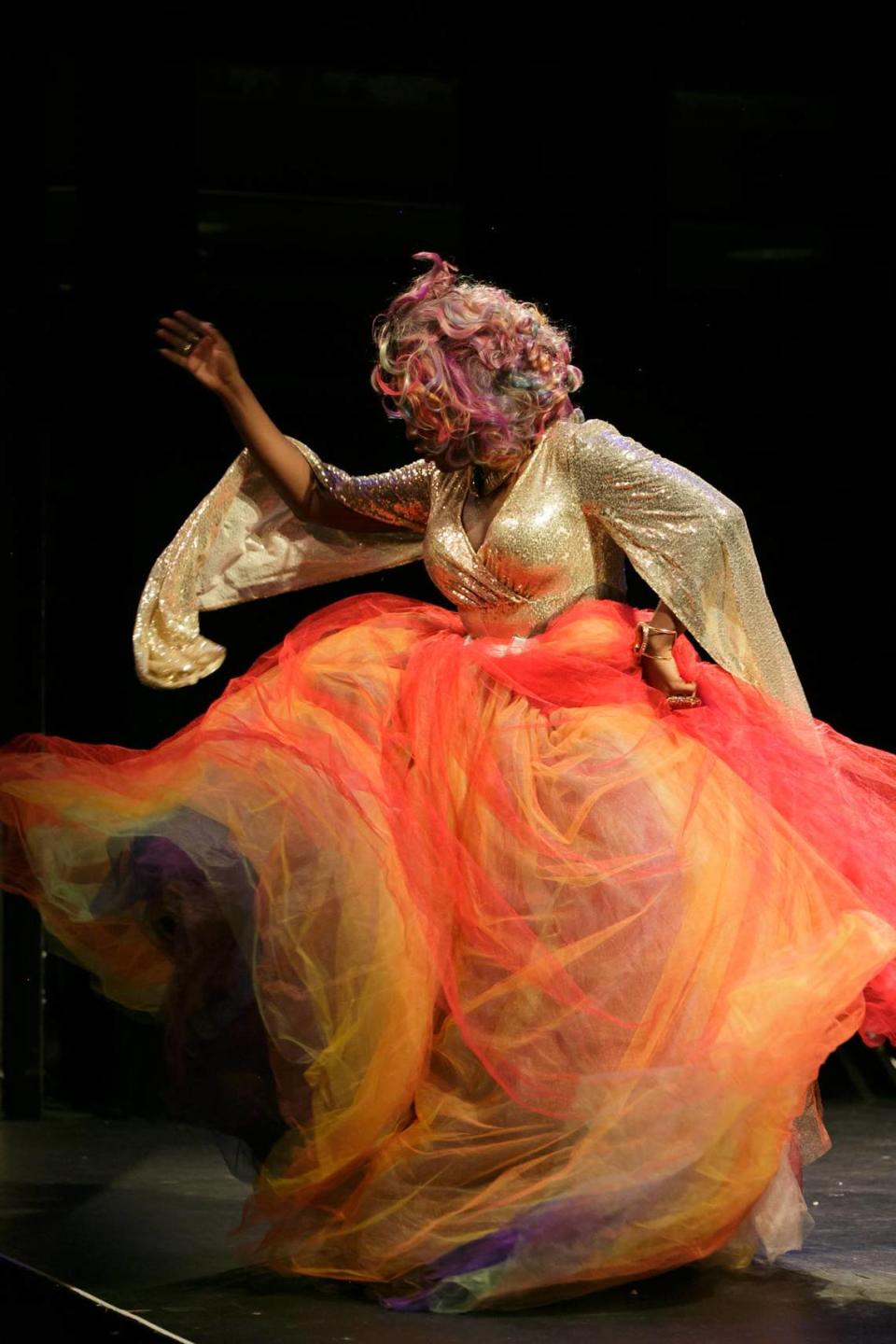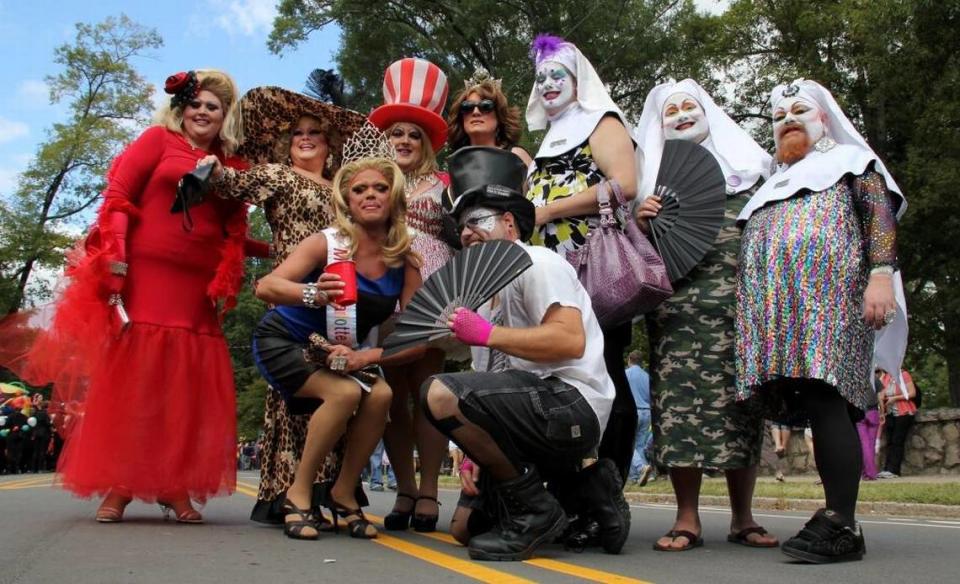These LGBTQ leaders made history in the Triangle. What does ‘pride’ mean to them?
- Oops!Something went wrong.Please try again later.
LGBTQ community members and their supporters celebrated the 10th annual Out! Raleigh Pride festival on Saturday wearing clothing with rainbow flags, watching drag queens perform, and perusing vendors selling ice cream and donuts, even Botox and health insurance.
The first, big pride event documented in North Carolina, however, was very different: a demonstration in Durham on June 27, 1981, held to protest a man (thought to be gay) being assaulted at Little River. He died from his injuries three days later.
The march was called “Our Day Out.”

“The title of it is significant,” said lesbian activist and writer Mab Segrest, 73, who is a longtime Durham resident. “It’s not a great leap, you know? It’s, like, give us one day!”
Now many North Carolina cities, including Raleigh, host pride celebrations. In June they align with the anniversary of the 1969 Stonewall riots in New York City against police raids targeting gay, lesbian and transgender establishments.
“Over the years, it has become increasingly more celebratory,” said Jim Baxter, former publisher of the now-defunct The Front Page, one of North Carolina’s first gay media outlets.

But one thing many early and current activists agree on is that pride events — and even the movement itself — are, and always will be, political in nature, no matter how celebratory they increasingly become.
‘The public voice of queers’
It had barely been five years since North Carolina’s first gay publication shut down when Baxter launched The Front Page in 1979. He was fresh out of college, and selling ads in the paper was tough.
“The only businesses I could get it from across the state were the gay bars,” he said. “That was basically my market.”
As a gay man, Baxter says he believed the only way to mobilize for equal rights in North Carolina — and even parallel the gay and lesbian communities in cities like Washington, D.C., Boston, or even Atlanta – would be through media and information.
So, Baxter persisted. He ran the paper for 26 years.
But running The Front Page was often a one-man show. Baxter credits its longevity to “the obsession of one person” — himself — and to outside jobs he took to make ends meet.
“I always wanted the paper to be more of a community effort than it was,” he said. “Until Equality NC, most [LGBTQ] organizations run by a committee just didn’t last longer than two to five years before burning out.”
Sometimes that burnout went hand-in-hand with the discrimination that came with promoting gay rights before the Don’t Ask Don’t Tell Repeal Act in 2010 opened the military to gay, lesbian and bisexual people and, five years later, the Supreme Court required states to recognize same-sex marriage.
Baxter was one of the few people across the state willing to consistently use their voice despite the potential consequences, Segrest says.
“The public voice of queers in North Carolina was pretty radical because it was those of us who decided we wanted to do (activism) at the expense of jobs,” she said. “A lot of people who were working their way through tenure or corporate positions, or something, weren’t willing to, and were glad that we were doing it.”

‘Looking back on the history of the movement’
To understand pride and why the fight for LGBTQ rights continues, activist Mandy Carter, 73, says it’s important to “think about how far we have come and the journey we have taken,” not only in LGBTQ rights, but racial justice, as well.
In an interview, Carter said she first understood the civil rights movement as a high school student in Schenectady, New York, in the mid-1960s when her social studies teacher spoke about catalytic events like the March on Washington for Jobs and Freedom.
“That high school teacher, Jack Hickey, brought some young white staffer from the Quakers,” she said. “He talked about the Quakers and the ‘Power of One,’ or whatever. But he said, ‘We have a high school work camp in the Pocono Mountains of Pennsylvania.’”
Carter ended up attending that camp. She learned about Bayard Rustin, a Black and gay civil rights leader, and writer-activist Audre Lorde, and about the Highlander Research and Education Center in Tennessee, where Rosa Parks and Martin Luther King Jr. trained in civil rights leadership.
“You had a lot of white folk and Black folk intentionally coming together to talk about how [to] collectively make it a collective ‘we’, and strategizing and organizing,” she said.
That experience led Carter to community organizing for racial justice and gay and lesbian rights in Durham and across the country, which she has done since the 1980s.

For Carter, the current demographic shift in the U.S. population is an opportunity to continue fighting for equality on many fronts. She refers to the majority of the population being female and becoming increasingly multiracial.
For example, U.S. Census data shows the multiracial population increased from 9 million people in 2010 to 33.8 million people in 2020.
“This is a game changing moment, in my opinion, just you know, demographically,” she said. “The reaction of a lot of [straight] white men getting concerned and scared that we’re in a moment of possibility ... I would say that excites me!”
Longtime gay and elder rights activist Les Geller, a member of Services & Advocacy for LGBT Elders (SAGE), thinks the country is at a turning point.
“My personal feeling is that we’re on the verge of maybe losing some of the rights we’ve worked so hard to achieve,” he said. “I’m concerned the politics that we’re running into these days are going to set us back, not move us forward.”
Moving forward
While he is still an active advocate, Geller said it is time for the younger LGBTQ people to pick up the fight for equality.
“If you ever get to the point where you take these rights for granted, I think that’s when the problems start,” he said. “You have to be vigilant — ever vigilant — about holding on to the power and the recognition that that we have achieved.”
That’s why, he added, Pride is more than a celebration for him.
“If I were young, if I were 20 or 25 years old, maybe it would be a party, but, you know, I’m from a different generation and I grew up in different circumstances,” said Geller, 76, who remembers the LGBT community still being “very underground” when he moved to Raleigh in 1994.
Raafe Purnsley, a Durham-based community organizer also known as local drag queen Stormie Daie, believes it is OK to have both.
Daie is a member of the House of Coxx, a drag family in Durham, led by Vivica C. Coxx, the drag persona of Durham Pride’s current lead organizer Justin Clapp.

“I think the reason why pride was so easily corporate-washed or picked up as capitalism, and you know, we focus on the festival, is because our existence has often been the protest,” Purnsley, 32, said. “Just us being has always been the protest.”
An Elon University graduate, he was one of the school’s founding members of the queer-straight alliance group Spectrum. After graduating, he helped start pride festivals and events in smaller cities like Burlington in Alamance County, where Elon is located.
Purnsley’s activism, whether as an organizer or entertaining as Stormie Daie, has expanded in recent years. He listed Apex, Chapel Hill, Carrboro, Fuquay-Varina, Raleigh and Durham as other places where he has been involved.
But it still isn’t always easy.

Most recently, Daie faced backlash and threats after a Drag Queen Story Hour was announced as part of this year’s Apex Pride. The town pulled the activity from the day’s line-up until Equality NC stepped in as the new sponsor and restored the event, The News & Observer previously reported.
“We’re the extroverts in our community that speak up for a lot of people. We’re usually the first to say anything. We’re also, you know, the taste testers,” Purnsley said. “If you want to learn about LGBTQ community — and you know better than to make someone do labor without paying them — go to a drag show! Pay a ticket, tip a drag queen, and if she’s worth the money you paid, then listen to her on the microphone, and you will learn something, I promise you.”
At St. John’s Metropolitan Community Church in Raleigh Vance Haywood, 40, is the lead pastor. A gay man, he credits historic drag queens of color like Marsha P. Johnson and Sylvia Rivera, two prominent figures of the Stonewall riots, for “some of the things we have today.”
“If it hadn’t been for their actions, we wouldn’t be where we’re at today, we wouldn’t have some of the things we have today,” he said. “All of this massive movement that now is global, worldwide, started with those folks that decided to take action, to stand for their rights, and people’s right to simply be who they are.”
Haywood remembers recently being at a protest and speaking with former United Methodist Church minister Jimmy Creech of Goldsboro. Creech was admonished by the church in the late 1990s for marrying same-sex couples.

“I asked him when we were marching around, ‘Jimmy, did you think that back in the early ‘80s when you were marching that we would still be here today, having to march?’ And he said, ‘Yes, absolutely.’ That this was going to be a long haul; we would still have to be doing this.”
NC’s openly LGBTQ legislators seek to find a balance when the political becomes personal

